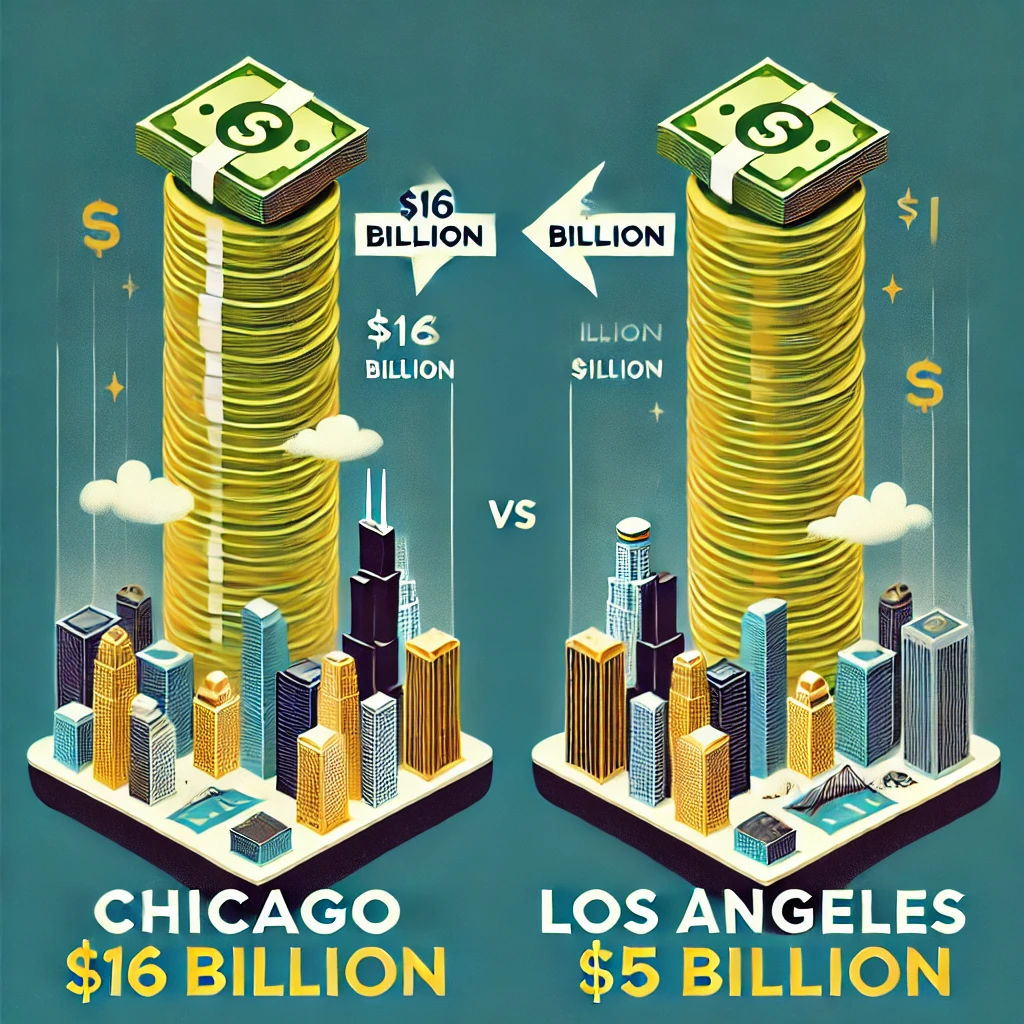Chicago, long celebrated for its towering skyline, deep-dish pizza, and storied history, now carries a dubious distinction: an annual operating budget that is a staggering $5 billion higher than that of Los Angeles. The discrepancy begs a critical question—why does the Second City, with a smaller population and arguably fewer sprawling responsibilities, spend so much more than its West Coast counterpart?
The numbers are stark. In 2023, Chicago’s operating expenses surpassed $16 billion, compared to Los Angeles’ $11 billion. This gap persists despite the fact that Los Angeles serves nearly a million more residents and spans an area more than double the size of Chicago. What’s behind this fiscal anomaly?

A Bureaucracy Run Amok
One glaring issue is Chicago’s labyrinthine bureaucracy. The city is infamous for its multitude of overlapping agencies and commissions, many of which seem to exist solely to perpetuate their own existence. For example, Chicago has 77 elected alderpersons, compared to Los Angeles’ 15 city council members. Each alderperson commands significant resources, from staff salaries to discretionary funds, creating a bloated municipal structure that is unparalleled in inefficiency.
Pension Promises Breaking the Bank
Chicago’s pension obligations are another major culprit. Decades of mismanagement and overly generous retirement packages for city employees have left the city grappling with one of the worst-funded pension systems in the nation. Pension contributions now consume nearly 20% of Chicago’s annual budget, compared to Los Angeles’ more sustainable 8%. Without significant reform, these obligations threaten to engulf the city’s finances entirely.
Policing Costs and Mismanagement
Despite recent population declines, Chicago’s spending on policing far outpaces Los Angeles. In 2023, Chicago allocated over $2 billion to its police department, while Los Angeles spent around $1.8 billion. Critics argue that Chicago’s approach to policing is not only expensive but ineffective, with funds often diverted to overtime pay and lawsuit settlements stemming from misconduct cases.
Questionable Priorities and Fiscal Mismanagement
Chicago has also developed a troubling habit of prioritizing flashy projects over essential services. From high-profile infrastructure projects that often run over budget to the $1 billion renovation of Soldier Field, the city’s spending priorities frequently leave residents scratching their heads. Meanwhile, basic services like public transit and sanitation remain underfunded and overstretched.
A Tale of Two Cities
While Los Angeles faces its own fiscal challenges, its leaner governance structure, relatively efficient public services, and proactive pension reforms have kept its budget in check. The contrast could not be clearer. Where Los Angeles adapts, Chicago flounders, saddled by a combination of outdated systems, entrenched interests, and a lack of political will to enact meaningful change.
The Cost of Inaction
Chicago’s financial trajectory is unsustainable. Unless city leaders address the root causes of this budgetary bloat, residents will continue to bear the brunt of the inefficiencies through higher taxes and diminished services. It’s time for Chicago to confront its financial reality with the urgency it demands—before it’s too late.
This is not just a matter of dollars and cents; it’s a question of accountability. For a city that prides itself on resilience and innovation, there’s no excuse for maintaining a budget that defies logic and fairness. Chicago deserves better, and the time to act is now.


Leave a Reply